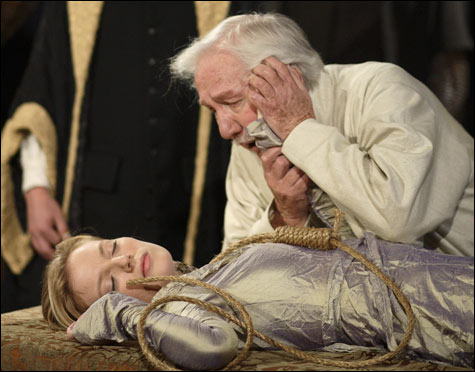
INSPIRED: You don’t need to know a thing about King Lear to be moved by William Hutt’s performance as cancer-stricken actor Charles Kingsman (here with Sarah Polley as Cordelia). |
As much as I adored The Sopranos, I have to wonder about the rush to anoint it the best television series ever. In fact, I don’t think it was even the best series to leave the air this past season. Those honors go to another show in which the members of a dysfunctional extended family bedded and betrayed one another at every turn while we waited — breathlessly — to see whether a central character would get whacked.
We’re talking Shakespeare, but have no fear. This is Will of the 21st-century world, not of the 16th and 17th. Some people have said that if Shakespeare were alive today, he’d be writing for television. I don’t know about that, but I’m willing to bet he’d love every minute of Slings & Arrows, the hilarious and hip series about a Shakespearean troupe in Canada that bears more than a passing resemblance to the real one in Stratford, Ontario.
The producers of the series, which aired on the Sundance Channel in the US, said they were interested in doing only three years, and true to their word, they finished up this past season — the final six episodes will join the previous two years on DVD shelves this Tuesday (Acorn Media). And whereas other great series in their last bow have gone for the mighty final gesture — Seinfeld and St. Elsewhere, in addition to The Sopranos — Slings & Arrows gracefully glides into an ending so sublime . . .
Unlike David Chase, I’ll finish that thought, but let’s start at the beginning. Oliver Welles — any relation to Orson is probably intentional — is the artistic director of the safely successful New Burbage Theatre Festival. He turns on the TV one day and sees his former protégé, Geoffrey Tenant, chain himself to the doors of his theater rather than let the landlord close it down. This is what theater should be about, thinks Oliver, who goes out and gets soused as he recalls how he lost his artistic vision. As he staggers about, he’s run over and killed by a truck carrying ham.
Funny, huh? Actually, it is. Oliver may be gone, but he’s not forgotten. Geoffrey is brought in at the last minute as the caretaker for the season, which includes Hamlet, the play that brought him fame and drove him to a nervous breakdown that was helped along by Oliver’s seduction of Geoffrey’s girlfriend, Ellen — this notwithstanding Oliver’s decided preference for the male of the species.
Before you can say, “There are more things in heaven and earth, Horatio,” Oliver is haunting Geoffrey’s waking hours with a hint of how better to interpret Hamlet here and a bit of spiritus ex machina there, the latter to get rid of a wayward Ophelia. This could all be Edgar-Allan-Poe-meets-Topper if the writing and acting weren’t so extraordinary.
The relationship between Stephen Ouimette’s Oliver and Paul Gross’s Geoffrey is so vivid and charged with envy and black-humored bitterness — with touches of love and respect — that it’s hard even to entertain the notion that Oliver is a manifestation of Geoffrey’s dottiness. The rest of the New Burbagers think Geoffrey’s lost it as they overhear him talking to the ghost — which, of course, they can’t see. When he challenges the wonderfully loopy postmodern director, Darren Nichols, to a duel, there’s not much doubt left about Geoffrey’s sanity.
What makes Slings & Arrows more than an inspired comedy, however, is the way the Shakespearean similarities are played for more than laughs. Engrossing analyses of the scripts are scattered throughout each episode, particularly when Geoffrey or Oliver is explicating a scene. To that woeful Ophelia, who thinks that her character’s little songs are just gibberish, Geoffrey pleads: “Ophelia is a child. . . . Her father is murdered by her boyfriend and he is suddenly shipped off to England. She is alone for the first time, grieving and heartbroken and guilty, because as far as she’s concerned, it’s all her fault. She ignored her brother’s advice and fell in love with Hamlet and now her father is dead, all because of her. And the pain and the loss and the shame and the guilt — all of this — is gnawing away at this little child’s mind and it comes out as little songs: ‘And will he not come again? And will he not come again? No, no, he is dead.’ My father’s dead and I killed him.”